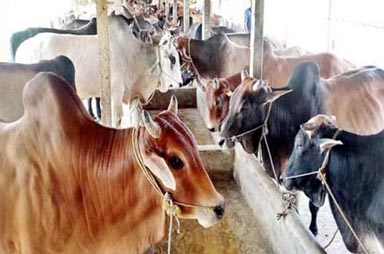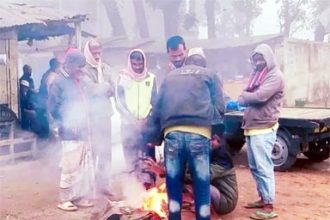Mohammad Akhter Hossain:
As Eid-ul-Azha draws near, cattle farmers in Bangladesh are grappling with the severe impacts of a prolonged heatwave, raising concerns of significant losses at a time critical for livestock sales.
The intense heat has resulted in cattle deaths and weight loss, along with decreased milk production, and an escalation in the costs associated with raising livestock.
After more than a month of oppressive heat, some relief came with rainfalls across parts of Bangladesh on Thursday. However, the Meteorological Department has predicted further heatwaves in May, posing continued risks for livestock.
- Advertisement -
Zubayer Hossain, owner of Urban Cattle Farm in Keraniganj, said one of his 80 cows died from heatstroke. “I’m controlling the cattle’s diet and taking extra care following a doctor’s advice. The other cows are doing well now, but I’m still in fear,” he said.
While no official records of livestock deaths due to extreme heat exist, Mohammad Imran Hossain, president of the Bangladesh Dairy Farmers Association, said he received reports of over 100 cow fatalities from association members.
“All of them were milk-producing large cows. I guess more cows died because of the heat,” he said.
Forty of these cows died in Sirajganj, where around 500 other cows had abortion, according to Imran.
“Farmers are preparing sacrificial cattle for Eid. They are feeling helpless now,” he said.
- Advertisement -
The number of cattle being prepared for Eid across Bangladesh is 13 million, including 6 million cows, Imran said.
“Milk production has fallen by 25 percent while most of the cattle have lost weight. The cost of rearing cattle has increased by at least 20 percent.”
He fears these factors will lead to a rise in cattle prices this Eid.
- Advertisement -
Mashrur Ahmed, the association’s joint general secretary, put the number of cow deaths because of heat at 2,000.
“Many large cows have lost 30 to 70 kg each. The cows producing 27 litres of milk each are giving 20 litres now,” he said.
The association advised farmers to give the cows a bath four times a day and give them saline water and vitamins, but cows cannot be saved in any ways, Mashrur said.
Towhid Parvez, owner of Bogura Vandar farm in the northern district, said the 160 cows in his farm are getting sick because of the heat. “Every one of them is losing weight. Milk production has fallen as well. I’m really in panic.”
Mizaur Rahman, Bera Upazila livestock officer in Pabna, said a farmer lost four of his 10 cows during the heatwave.
Tests revealed nitrous poisoning as the cause of the cows’ deaths.
“This poison gets into the grass from the soil because of extreme heat,” Mizanur said.
Farmers alleged government veterinarians were charging them fees for treatment.
Md Shahinur Alam, a director at the Department of Livestock Services, said the veterinarians cannot take fees from the farmers if the cows are brought to the centres.
“Many farmers cannot bring the cattle. The veterinarians visit the farmers’ homes in that case. The farmers may have given the veterinarians some money if they are happy with the services. But we’ll take steps if a poor farmer is forced to pay,” he said.
He also said the farmers need to pay for certain services at government-fixed rates, including artificial insemination.
“And we can’t supply medicines all the time. The farmers need to buy the medicines,” Mizanur said.
Professor KBM Saiful Islam, chairman of medicine and public health department at Sher-e-Bangla Agriculture University, said cows can tolerate temperatures between 15 and 25 degrees Celsius.
“They suffer heat stress when temperatures rise above 25 degrees Celsius. If the mercury gets past 30 degrees Celsius, cows may face small breathing and other problems.
“Temperatures above 36 degrees Celsius are dangerous for cows. These can cause different types of diseases or death from heatstroke,” Prof Saiful said.
He advised the farmers to feed the cows less during heatwaves, although it leads to weight loss.
The cows should not be given heavy food, but three times as much water as usual in the daytime. To keep the farms cool, the farmers can use sacks to cover tin roofs and arrange fans.
The cows should be given a bath at least once a day, and water sprinkled frequently on them.
Mixing glucose and vitamin C with water will also give the cattle some comfort, Prof Saiful said.
He also mentioned the 16358 helpline for dairy farmers at business hours.









